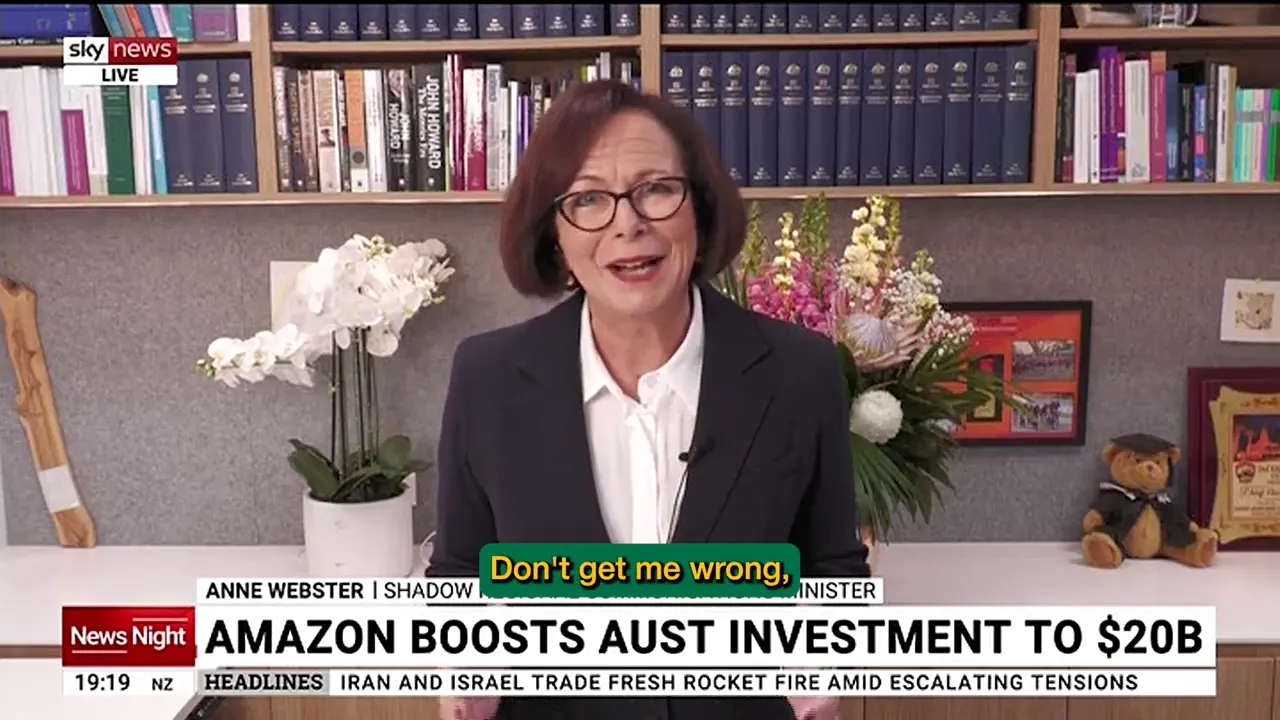Interview with Jaynie Seal, Sky News - Transcript - Sunday 15 June 2025

Shadow Minister for Regional Development, Local Government and Territories - Shadow Minister for Regional Communications- Transcript - Interview Sky News - 15 June 25
DR ANNE WEBSTER MP
SHADOW MINISTER FOR REGIONAL DEVELOPMENT, LOCAL GOVERNMENT AND TERRITORIES
SHADOW MINISTER FOR REGIONAL COMMUNICATIONS
FEDERAL MEMBER FOR MALLEE
TRANSCRIPT
TOPICS: Amazon $20 billion investment in Australia – Artificial Intelligence – Nuclear Energy
SEAL
Joining me live now is Shadow Regional Development, Local Government and Territories minister Dr Ann Webster. Thank you so much for joining us. Yes, we're hearing it's the largest global technology investment in our history and we're certainly going to be needing it by the sounds of it because as we just heard there, we're going to see some more solar developments - enough to power 290,000 homes. What did you make of those comments?
WEBSTER
Look, I find it … it's obviously exciting that this investment is being made in Australia. Let's just make that very, very clear in terms of data and AI. My understanding is they need reliable baseload power, that's not wind and solar - just flagging for those who aren't aware of that - and it's very interesting to me that the Prime Minister talks about anything but nuclear. And yet Amazon, Microsoft, Google are all investing in nuclear, whether it's small modular reactors right next to the data centres or whether for Microsoft, Three Mile Island, which they are reviving for the massive amount of power that is required for data and AI. So this is exciting, Jaynie, don't get me wrong, but I think the Prime Minister has a couple of issues. One of them is that the unions apparently are going to be a bit upset about AI. And then of course, is how is he going to ensure that stable base load power and it's not going to be through wind and solar.
SEAL
And just reading the Massachusetts International Technology website there, who are very much across this as well. They write in 2017, AI began to change everything and data centres really started to get built with energy intensive hardware designed for AI, led them to double their electricity consumption by 2023, so these numbers we're going to see more and more of course, and your question on nuclear, certainly perhaps one thing that we need to at least potentially lift the ban just to go to that next step. But how is that going to happen with the Opposition?
WEBSTER
Well, we in The Nationals, obviously we were the first to step up and say we need to go nuclear, literally. And let's be very clear for those who don't understand, we are not talking about enriched uranium, as in missiles. We're talking about power generation. It is a completely different use. For uranium and nuclear power is something that The Nationals absolutely stand by for our future. The Coalition have agreed to that in the future, whether it's simply lifting the moratorium, those discussions will continue over the next little while, or whether it is, you know, as we took to the election 7, for a start, 7 government-owned facilities. I think our first step is to lift that moratorium and allow the nuclear discussion to occur and The Nationals are totally behind private business, making that investment in Australia. The fact is, we need it and the government right now is going to be giving a $4000 subsidy to people so they can put their battery - which actually costs each consumer mind you - $9300 to put the battery on their house. That's well and good, but it certainly doesn't cover all of those hours at night or when there's no wind. So, where the government is going right now is by no means to provide a stable base load power, which is what Australia needs to lift its productivity, reduce our power prices and step into the future.
SEAL
So what does it need then? Because clearly in the federal election there was a huge number of people that were totally against having nuclear energy. Was it a poor policy pledge? Do people perhaps need to look further into it and be more informed of what it is like they might … but then they might not like it. So, what happens if it still doesn't go ahead? How are we going to be able to have as much energy to power AI?
WEBSTER
Well, the fact is I think there's a big question about that, Jaynie and that's for Labor to answer because they are in government, I think to say that people were ‘against nuclear’, that's not how I read this. I think that the marketing, like several other policies, that we won't go into now, didn't occur. We didn't stand up strong and talk about those things and that was the problem from our side. But to say that the Prime Minister has an overwhelming, you know, anti-nuclear position, they got what 32 per cent of the vote? I don't think that is, you know, incredibly demanding of a statement that says Australia didn't want nuclear. I think most of the people that I speak to are absolutely supportive of nuclear energy. I can tell you what they don't want to do, and that's to continue to pay for the transmission lines and the renewable energy that needs to be refurbished, revived, replaced, transitioned in the next few years. So, you know, we've got to think about it being affordable for Australians. That is the first call and then a strong baseload power that enables us to literally bring on the future, whether it's AI data centres or manufacturing, we must go in that direction.
SEAL
It's certainly an ongoing debate. Dr Anne Webster, as always, thank you.



